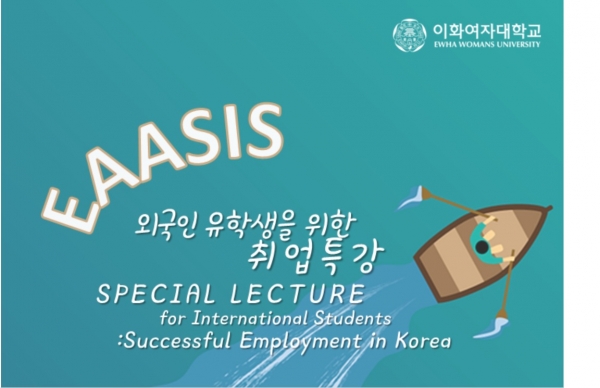
Ewha Academic Assistance System for International Students (EAASIS) held a Special Lecture for International Students: Successful Employment in Korea from Nov. 12 to Nov. 19. Three sessions were held in total on Nov. 12, 16, and 19. The sessions consisted of lectures on employment preparation in Korea hosted by Edubooks, a company that specializes in supporting international students in their employment competency.
Han Ji-hoon, the CEO of Edubooks, started the lecture explaining that visa preparation is the foremost step. Students should start preparing for employment by investigating visas that would be most beneficial when staying in Korea. Among visas foreigners can apply for, international students may be interested in mainly five types of visas: D-2 Study, D-10 Job Seeker, E-7 Professional, F-2 Residence, and F-5 Permanent Residency. As the lecture aimed to help international students get employed, the content mainly dealt with D-10 and E-7 visas.
Han explained that the D-10 visa, which can be validated for two years, is for those with Bachelor’s degrees. Students need to submit the Plan for Seeking Employment, and they may want to focus on writing the Plans for Employment Seeking Activities category.
For international students to successfully attain or change their visas into employment visas, Han recommended students to prepare four things during their university life: completing the KIIP (Korean Inventory of Interpersonal Problems), mastering computer spreadsheet and database, specializing in one’s major studies, and finally enhancing English proficiency skills.
EAASIS also provided a session on Nov. 16, in which the international alumni of Ewha shared their experiences of getting a workplace in Korea.
Krawmoh Wanida, who studied Korean Language and Literature for her Doctor’s degree, introduced various experiences she participated in during her life at Ewha, such as interpretation, translation, and teaching. For example, she took part as a translator for the book “Dollar Good Dream Department Store” Thai Edition. She was able to learn patience through the opportunity, since it took over a year editing and revising her translation. Now, she currently works as a full-time professor at Silpakorn University, teaching students majoring in Korean.
Yan Wenhui, a Master’s alumni of the Division of Communication and Media, introduced various paths one could take when planning on one's future. Yan tried to appeal her expertise through her internship experiences and variety of experiences through activities she participated in while at Ewha.
“It would be helpful for you to maintain a good relationship with your professor if you are planning to attend master’s degree either in Ewha or other graduate schools,” Yan said.
Yan also advised students to utilize THE Portfolio, as the school helps students when writing their curriculum vitae (CV). Students interested in finding workplaces in Korea are recommended to participate in the Job Fair for International Students held every year.
Caroline Hamminga, who studied International Business in Ewha Graduate School of International Studies, advised students to search on platforms such as Coursera, Udemy, or Edx based on what business sector you wish to work in.
“Try to attend as many conferences you can since it may get difficult to do so once you become a graduate,” Hamminga said. “Also, learn Korean as much as you can by taking Korean language courses at Ewha.”
Lastly, on Nov. 19, Han explained instructions on filling up the D-10 Plan for Seeking Employment and writing attractive resumes. He also shared tips for successful interviews to help students prepare for employment.
Lara Peters, a freshman of Division of International Studies, shared her opinions after taking the lecture. She decided to participate in the lecture because she is planning to seek a workplace in Korea after graduation.
“As a major of International Studies, I am generally really interested in the Korean culture and market. I was also amazed by Korea’s fast economic growth throughout the years,” Peters said.
Peters shared that Hamminga’s presentation was especially interesting as she shared specifically about her experiences on Korean job interviews. Listening to her experiences helped Peters become aware of the cultural differences in terms of job interviews between Korea and other countries. Peters explained how the lectures have given her the courage to prepare for her future career in Korea.
“I think all foreigners can relate that getting employed in Korea can be really intimidating, since the competition is high and there are a lot of obstacles we have to overcome, such as the language barrier, the culture differences, and so on,” Peters said. “But the special lectures have showed me that it isn’t even that intimidating at all and I realized taking Korean language and culture classes can be a good first step to prepare for employment in Korea.”

